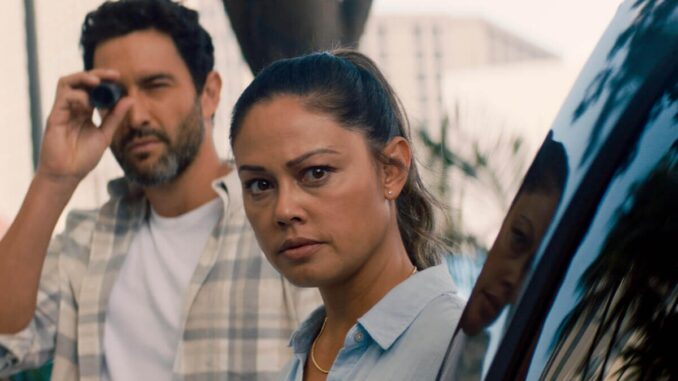
When you think of Hawai‘i, what pops into your mind first? Sun-drenched beaches, swaying palm trees, maybe even a plate of poke or a hula dance. But if you’ve tuned into NCIS: Hawai‘i, you know there’s so much more beneath the surface. This show isn’t just a crime drama set in a tropical paradise—it’s a cultural tapestry, weaving local traditions, history, and modern life into every storyline. Let’s dive in and explore why NCIS: Hawai‘i is more than just a beautiful backdrop.
The Unique Setting of NCIS: Hawai‘i
Hawai‘i is a treasure trove of culture and history, and setting a crime drama here opens up layers most viewers might never see. Unlike other NCIS series, which often feature major cities like Los Angeles or Washington D.C., NCIS: Hawai‘i takes advantage of the islands’ unique geography, indigenous heritage, and tight-knit communities.
Keyword Insight: “NCIS Hawai‘i setting,” “Hawaiian culture in TV shows”
A Blend of Modern Life and Traditional Values
What sets NCIS: Hawai‘i apart is its attention to balancing the modern with the traditional. From tech-savvy investigations to the respect for Hawaiian customs, the show portrays the islands as living, breathing communities—not just a vacation spot.
Cultural Sensitivity in Storytelling
The writers take care to integrate Hawaiian language, chants, and historical references accurately. For instance, certain episodes reference pono, a Hawaiian concept of righteousness and balance—a value that influences both the characters’ personal choices and their approach to justice.
Local Landmarks as More Than Just Backdrops
From Iolani Palace to sacred volcanic sites, the series highlights real locations that carry historical significance. This isn’t just eye candy; it’s a subtle educational journey for viewers worldwide.
The Cast: More Than Just Characters
Each character on NCIS: Hawai‘i brings their own story that intertwines with the islands’ culture.
Jane Tennant – Breaking Barriers
Played by Vanessa Lachey, Jane Tennant is the first female lead in the NCIS franchise. Her role doesn’t just showcase professional excellence—it mirrors the growing influence of women in Hawaiian society and military communities.
Supporting Characters and Cultural Representation
The team includes locals who embody different aspects of Hawaiian life. Their interactions with Jane offer a glimpse into the balance between tradition and modernity, echoing real-life Hawaiian society.
Hawaiian Language in the Series
Language is a cornerstone of any culture. NCIS: Hawai‘i makes it a point to sprinkle authentic Hawaiian words and phrases throughout its dialogue.
Why Language Matters
Including Hawaiian terms isn’t just for flair. It preserves cultural identity and allows the audience to appreciate the islands’ heritage. Fans often learn words like aloha, mahalo, and pono through context, subtly educating viewers while entertaining them.
The Role of Local Consultants
The show employs Hawaiian cultural experts to ensure accuracy. From pronunciation to historical references, these consultants make sure the representation is respectful and authentic.
Storylines Inspired by Local Issues
Many episodes of NCIS: Hawai‘i draw inspiration from real-life challenges faced by Hawai‘i communities.
Environmental Awareness
Hawai‘i’s unique ecosystem is frequently highlighted. Episodes touch on issues like illegal fishing, coral reef destruction, and land conservation—blending crime-solving with environmental advocacy.
Military and Local Dynamics
With a significant naval presence in Hawai‘i, the show explores how military operations intersect with local communities. This adds layers to both plot and character development, reflecting the real-life balance Hawaiians maintain between tradition and external influences.
Showcasing Hawaiian Arts and Music
Music and visual arts are integral to Hawai‘i’s identity, and NCIS: Hawai‘i incorporates them thoughtfully.
Authentic Soundtracks
From ukulele strums to traditional chants, the background score often features local musicians, giving episodes a distinctly Hawaiian rhythm.
Visual Storytelling Through Dance
Hula and other traditional dances occasionally appear, not just as entertainment, but as narrative tools to highlight cultural moments or character emotions.
Tourism vs. Reality
Many shows set in Hawai‘i focus heavily on tourism, often portraying the islands as a fantasy getaway. NCIS: Hawai‘i, however, presents a more grounded perspective.
Balancing Scenic Beauty with Everyday Life
While the series embraces gorgeous visuals, it also portrays real-life issues: traffic, local housing concerns, and community struggles. This adds authenticity, making it more relatable to both residents and global audiences.
Cultural Tourism Education
By showing the real Hawaii beyond postcards, the show subtly encourages respectful cultural tourism—viewers leave with a better understanding of the islands’ heritage.
Community and Family Themes
Family and community are at the heart of Hawaiian culture, and NCIS: Hawai‘i highlights this in multiple ways.
Team as Ohana
The NCIS team isn’t just colleagues; they operate like ohana (family), a concept deeply rooted in Hawaiian tradition. Loyalty, respect, and personal sacrifice are recurring themes, reflecting local values.
Intergenerational Respect
Episodes frequently show characters interacting with elders or mentors, emphasizing respect for wisdom and history—a subtle but meaningful cultural nod.
Cultural Consultation Behind the Scenes
Creating a show that respects Hawaiian culture requires more than cursory research.
Local Experts and Advisors
Cultural consultants ensure everything from costume authenticity to historical accuracy. This attention to detail elevates the show above other franchises that may superficially exploit exotic settings.
Community Engagement
The production often collaborates with local organizations, supporting Hawaiian art, education, and heritage programs. It’s entertainment with a purpose.
Festivals and Traditional Practices Highlighted
Certain episodes highlight Hawaiian festivals, rituals, or practices.
Celebrating Hawaiian Holidays
Episodes around events like Lei Day or Merrie Monarch Festival bring local customs to a global audience. This isn’t just a backdrop; it’s storytelling woven into the narrative.
Respectful Representation
Rather than using festivals as mere props, the show respects the rituals’ significance, showing viewers why these traditions matter to locals.
The Role of Cuisine
Food is a subtle but powerful cultural marker.
Local Flavors on Screen
Characters often interact over meals featuring Hawaiian dishes. From poke bowls to plate lunches, the cuisine grounds the story in authentic island life.
Food as Cultural Storytelling
Meals aren’t just filler—they reflect relationships, family traditions, and cultural identity. Think of it as flavor-driven storytelling.

Fashion and Costume as Cultural Symbols
Costume design subtly conveys cultural respect.
Beyond Aloha Shirts
While the iconic aloha shirt appears, the wardrobe often includes traditional motifs, modern island styles, and military influences, reflecting the islands’ layered identity.
Symbolism in Uniforms
From law enforcement attire to ceremonial clothing, costumes convey respect, professionalism, and cultural sensitivity.
How NCIS: Hawai‘i Educates While Entertaining
At its core, the show balances entertainment with subtle education.
Introducing Viewers to Hawaiian Concepts
Through storylines, language, and interactions, audiences learn about Hawaiian values like aloha, pono, and malama (care).
Impact on Global Perception
By presenting a respectful, nuanced view, the show counters stereotypes and promotes a richer understanding of Hawaiian life and culture.
Why NCIS: Hawai‘i Stands Out
It’s not just the sun, sand, or crime drama that makes NCIS: Hawai‘i special—it’s the respect for the people, history, and environment of the islands.
A Series With Depth
The series balances action, drama, and cultural storytelling, creating a show that’s engaging, educational, and visually stunning.
Lasting Cultural Impact
Beyond entertainment, the show fosters appreciation for Hawaiian culture and encourages viewers to look beyond the surface.
Conclusion: More Than Just a Crime Show
NCIS: Hawai‘i is more than a tropical backdrop for crime-solving—it’s a celebration of Hawaiian culture, history, and values. By weaving authentic language, customs, and community themes into its narratives, the show educates, entertains, and honors the islands. Next time you watch, don’t just marvel at the beaches—notice the subtle layers of culture that make every episode resonate far beyond paradise.
5 Unique FAQs About NCIS: Hawai‘i and Its Cultural Layers
Q1: How accurately does NCIS: Hawai‘i portray Hawaiian culture?
A1: The show employs cultural consultants and incorporates local language, traditions, and values, ensuring respectful and accurate representation.
Q2: Are real Hawaiian locations used in the series?
A2: Yes! Many episodes feature landmarks like Iolani Palace and volcanic sites, blending crime drama with cultural education.
Q3: Does the show include local Hawaiian music?
A3: Absolutely. Soundtracks often feature traditional chants, ukulele music, and local musicians, creating an authentic island vibe.
Q4: How does NCIS: Hawai‘i handle language?
A4: Hawaiian terms like aloha, pono, and malama appear throughout, helping viewers understand key cultural concepts naturally.
Q5: Can NCIS: Hawai‘i influence tourism responsibly?
A5: Yes, by showcasing authentic culture and community life, the show encourages respectful tourism that goes beyond surface-level sightseeing.